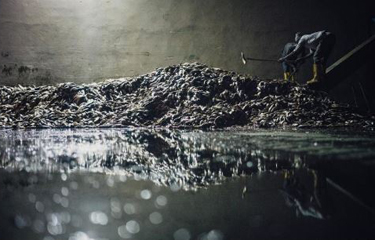A Greenpeace report that will be published later this year details food security issues caused by the fast-growing fishmeal industry in West Africa.
The report will detail the value chain and chain of custody of the African fishmeal industry, claiming the sector’s growth is being fed by overfishing and other unsustainable practices, according to Ibrahima Cisse, the Senegal-based Senior Oceans Campaign Manager at Greenpeace Africa. Those problems, in turn, are driving migration as West Africans dependent on small-scale fishing for food and income lose their livelihoods, Cisse said.
E.U. migration from Senegal is being driven in part by the exploitation of fishery stocks for fishmeal production – by both Asian and European companies, Cisse told SeafoodSource. The E.U. needs to foster a better region-to-region partnership with the West African regional group ECOWAS to ensure sustainable fisheries management if it wants to stem the tide of increasing immigration from the region, Cisse said.
“Migration is a big political topic in Europe but many Senegalese artisan fishermen have been squeezed out of the supply chain due to the buying up of local fish stocks by fishmeal companies,” Cisse said.
Cisse said his study group was alarmed by the rapid expansion of fishmeal plants in Mauritania and in Senegal, which have been funded by firms from China, Spain, and Turkey. In 10 years, the number of fishmeal plants in Mauritania has quadrupled to 40 currently, Cisse said. Of that total, three are located in Senegal “but there are applications to open two more,” he said.
Total global fishmeal production in 2020 increased by 11 percent with respect to the previous year, according to the IFFO, while global fish oil production rose 12 percent last year. The world’s largest fishmeal consumer, China, has ramped up its demand as it regenerates its pick stocks after dealing with disease outbreaks that culled as much as half of its herd. That growing demand has attracted Chinese corporates, including large state-owned entities, into the fishmeal sector. Last year, Qingdao Conson Financial Holdings bought Baiyang Industrial Holdings’ Mauritanian fishmeal production, and Fuzhou Hong Dong Yuan Yang Fishing Co. has increased its fishmeal production in West Africa.
But Chinese companies are not considering the sustainability of the local fisheries supplying the plants with raw materials, according to Cisse. Additionally, Cisse said fishmeal companies often falsely claim to use trimmings rather than fresh fish for raw materials.
“There is a big gap between the supply of trimmings and fishmeal output in West Africa. The volumes of trimmings required to produce these volumes of fishmeal are not here,” he said.
It’s “naïve” for smaller West African countries to think they can fairly negotiate directly with Chinese fishmeal firms, said Cisse. The average Chinese company operating in West Africa has a higher valuation and operational earnings than the gross domestic product of many of the countries in the region, according to Cisse.
Cisse said he wants the European Union to use its diplomatic clout to force collective regional action against overexploitation of fisheries by fishmeal plants.
“Institutionally, the E.U. is stronger. China is doing big projects but [the E.U.] is the supporter of budgets in many [West African] countries. The dependency of western Africa on the E.U. is huge,” he said. “The E.U. is still thinking of negotiating bilaterally with African countries, there is no long-term view. It needs to come to a deal with the region as a whole so it can continue to supply the E.U., but also ensure that resources are managed sustainably.”
Photo courtesy of Liu Yuyang/Greenpeace







